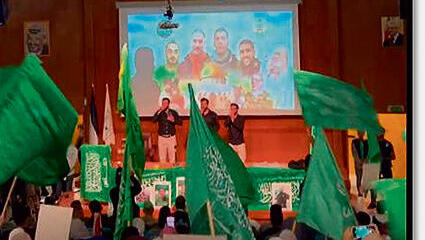Getting your Trinity Audio player ready...
As part of the planned hostage deal, Israel is set to release hundreds of Palestinian prisoners by the end of the week, many of whom will return to the West Bank. Despite efforts by the IDF's Central Command to curb celebrations, images of terrorists rejoicing continue to circulate online.
A specialized counter-incitement unit, formed within Central Command at the outset of the war, has been at the forefront of efforts to combat public and online incitement. Led by military prosecutors in the West Bank Division, the unit operates in coordination with intelligence officers and operational teams under the command of Maj. Gen. Avi Bluth.
Palestinians in the West Bank celebrate release of prisoners
In 2024, the unit has filed 303 indictments for incitement offenses. In comparison, the West Bank Military Prosecution typically filed 60 to 70 such cases per year in the past. During the 2015 wave of lone-wolf attacks, that number peaked at around 150.
"There is no doubt we've seen a surge," a senior official in the West Bank prosecution said. "Before the war, this issue fell through the cracks. It requires coordination between multiple agencies. Immediately after Oct. 7, we saw a sharp rise in online incitement, particularly among women, with people praising martyrs and glorifying Hamas' attack."
The official outlined the challenges of enforcement, explaining that legal complexities often make it difficult to define incitement. "For example, someone wrote after Oct. 7, ‘a great and glorious act.’ On the surface, it looks like incitement, but it could be interpreted differently. We have to consider context and the use of certain phrases rather than just their literal meaning."
Get the Ynetnews app on your smartphone: Google Play: https://bit.ly/4eJ37pE | Apple App Store: https://bit.ly/3ZL7iNv
Investigators employ technological tools to track incitement but must go beyond simple screenshots. "Once we detect incitement on a Facebook post, for instance, we need to ‘capture’ the entire page," the official said. "We scroll through past posts, gather as much evidence as possible to establish a pattern of incitement and link the page to a specific suspect. Then, we build an indictment under a defined legal provision."
To aid prosecutions, the military commander of Central Command issued a minimum sentencing order after the war began, mandating at least one year in prison for incitement, with at least six months served behind bars.
Among those arrested by the counter-incitement unit were members of a Palestinian band called Al-Ibaa, which performed at various venues in the West Bank. According to an indictment, after Oct. 7, the student council at An-Najah University in Nablus invited one of the band's singers to perform at an event.
The singer agreed to a payment of 4,000 shekels. When the band arrived in early May, they realized the event was a memorial for "martyrs" and was decorated with Hamas flags. During the performance, the musicians sang, "Advance, O Hamas, you strike fear into everyone. May God grant you victory."
In another case, prosecutors indicted a 50-year-old Palestinian woman from the village of Sanur in the northern West Bank for multiple inciting posts on social media. She allegedly shared an illustration of Hamas terrorists with the caption "Al-Aqsa Flood"—the name Hamas gave to its Oct. 7 attack. In a separate post, she wrote, "Tel Aviv is burning. Praise be to God. May God guide our army’s fire," accompanied by a green heart—Hamas’ signature color.
Israel’s counter-incitement efforts are expected to intensify as the war continues, with authorities closely monitoring online activity and taking legal action against those suspected of encouraging violence.






